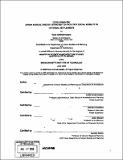Food urbanism : urban agriculture as a strategy to facilitate social mobility in informal settlements
Author(s)
Amirtahmasebi, Rana
DownloadFull printable version (34.02Mb)
Alternative title
Urban agriculture as a strategy to facilitate social mobility in informal settlements
Other Contributors
Massachusetts Institute of Technology. Dept. of Architecture.
Advisor
Adele Naude Santos and Reinhard Goethert.
Terms of use
Metadata
Show full item recordAbstract
Can community-based urban agriculture generate stronger communities? How is this possible? This thesis explores the possibility of community development through application of community gardens in an informal settlement near Tehran, Iran. It is expected that this will happen through collective community action and decision-making processes. The role of the architect and planner has studied and defined as the facilitator. The hypothesis was that if the community members share a common piece of land and create a framework for sharing this space over time, they would strengthen their community ties and interaction. In other parts of the world, particularly in poor and disadvantaged areas, urban gardens provide a powerful vehicle for food production and local access while build up on the community's social and political capital. After careful analysis of the community's public life and spaces, this thesis defines four dimensions for an urban agriculture project. While the land use dimension defines the selection criteria for potential community gardens, the social development dimension explores the ways to include different social groups in the process. In the implementation strategies dimension, the technical issues of an urban agriculture project have been studied. Finally, the fourth dimension outlines a strategy for enabling the community to set up a sustainable urban community garden in their neighborhood.
Description
Thesis (M.C.P.)--Massachusetts Institute of Technology, Dept. of Urban Studies and Planning; and, (S.M.)-Massachusetts Institute of Technology, Dept. of Architecture, 2008. Pages 154 and 155 blank. Includes bibliographical references (p. 147-153).
Date issued
2008Department
Massachusetts Institute of Technology. Department of Architecture; Massachusetts Institute of Technology. Department of Urban Studies and PlanningPublisher
Massachusetts Institute of Technology
Keywords
Urban Studies and Planning., Architecture.